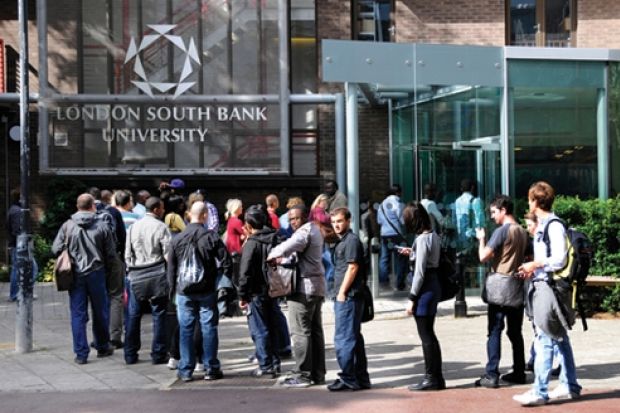England's universities were fined almost £21 million for recruiting too many students this year, more than double the £8 million they were fined last year.
London Metropolitan University received the largest single fine (£5.9 million), followed by Leeds Metropolitan University (£3.1 million), the University of Plymouth (£1.2 million) and the University of the West of England (£1 million), according to figures published by the Higher Education Funding Council for England.
Fines levied by Hefce totalled £20.5 million across 40 universities in 2011-12, compared with £8.1 million across 14 universities in 2010-11. Further education colleges were fined £1.3 million this year.
Student numbers are capped at each higher education institution in order to control the costs of publicly funded student support.
Although the rise in fines appears steep, the sector's total over-recruitment of students is not as high as many expected. With the fine per student standing at £3,800, higher and further education's tally of about £21.9 million points to a total over-recruitment of around 5,750 students.
That is far below the level of 25,000 predicted by some in the sector when Times Higher Education reported the size of London Met's fine in February.
There had been suggestions that universities had deliberately over-recruited this year, in anticipation of a fall in student demand in 2012-13.
Despite less dramatic over-recruitment than expected, vice-chancellors and registrars warn that the balancing act between under- and over-recruitment will become more precarious in 2012-13, when the over-recruitment fine per student is expected to rise to £10,000. At the same time, the risk of under-recruitment will become greater as funding is routed principally via students and their loans.
Malcolm Gillies, vice-chancellor of London Met, said of the situation in 2012-13: "If you're over, you will be fined a very significant sum of money. If you're under, you won't get the resource."
He added: "The biggest surprise to us in 2011-12 was the very different conversion rate of offers into admissions, and we want to get the best possible hold on that in what is clearly a very turbulent time."
London Met had taken external guidance from Deloitte in revising its number control method for next year, Professor Gillies said.
However, he added: "We're going into a new [fees] system, and it will be very hard to predict the conversion rate."
Newer universities are more at risk of fines for over-recruitment because they recruit more heavily in clearing and thus find it harder to hit their student number targets.
Pam Tatlow, chief executive of the Million+ group of newer universities, said of 2012-13: "Managing admissions and student number controls will be like playing poker with a blindfold.
"It is perverse that universities which do best at recruiting students who add value to the government's social mobility agenda will be most at risk of being fined in 2012."
The government's AAB policy means that in 2012-13, many Russell Group and 1994 Group universities will not be capped on student numbers. Private providers are not subject to any cap on their recruitment.
Matthew Andrews, chair of the admissions practitioner group at the Academic Registrars Council, highlighted the additional difficulties posed by the AAB system in 2012-13.
The recent change, which permits unlimited recruitment of students who gain AAB grades or better at A level, means "you're not quite sure whether a student will be out of your [numbers cap] target or within until they get their grades", he said.
Mr Andrews added that current data suggest that students are declining offers at a higher than usual rate for 2012-13. He said of conversion rates between offers and admissions: "All the predictions we've had in the past, you can't rely on."
Higher fines mean the implications of missing the student number target "become more significant, precisely at the time where it is more difficult to achieve it because of the changes", he said.
A number of older universities were hit with over-recruitment fines this year.
The University of Sheffield, a member of the Russell Group, was fined £448,400. The University of Reading and the University of Sussex, both members of the 1994 Group, were fined £114,000 and £661,200 respectively.
Hefce also levied an additional £4.8 million in fines against universities that failed to offset previous over-recruitment.
